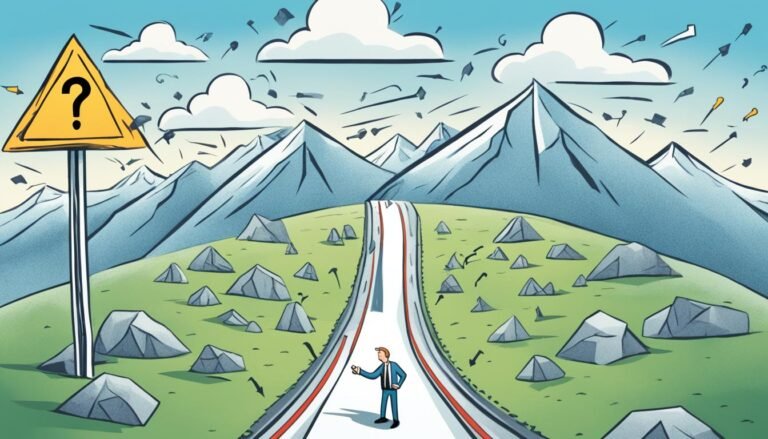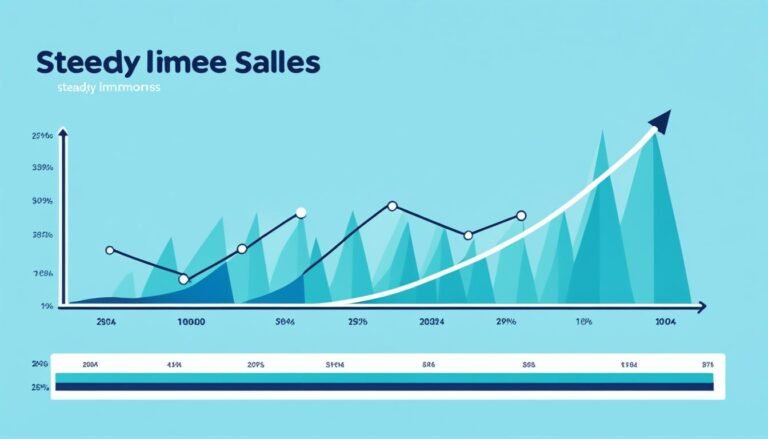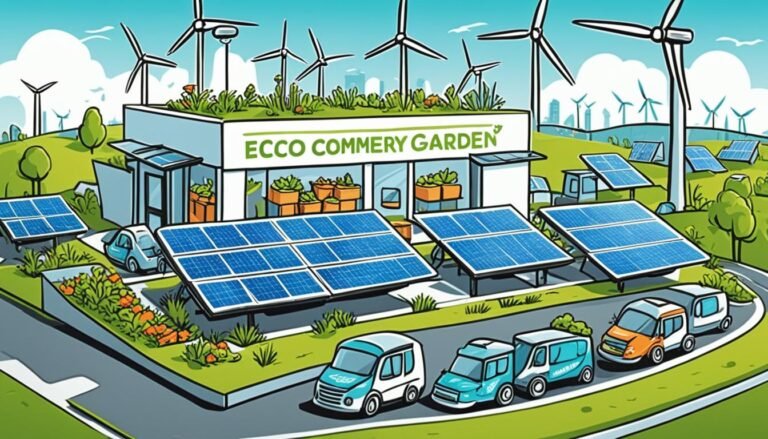Unlocking Motivation: The Psychology of Sales Incentives
Sales incentives are an essential tool for driving performance and motivating sales teams. Understanding the psychology behind incentives can help businesses create effective sales incentive programs that inspire salespeople to achieve outstanding results. By tapping into the innate motivations of sales professionals, companies can unlock their full potential and foster a culture of excellence.
Key Takeaways:
- Understanding the psychology behind sales incentives is crucial for creating effective programs.
- Setting clear and challenging sales goals fuels motivation and drives peak performance.
- Recognition and status enhance motivation by tapping into the desire for social validation and competition.
- Immediate rewards, such as spot bonuses, reinforce positive behavior and create a sense of accomplishment.
- Gamification elements and healthy competition stimulate sales team performance.
The Power of Goal-Setting
Setting clear and challenging sales goals is a fundamental aspect of sales incentive programs. Goals provide a sense of direction and purpose, motivating salespeople to strive for success. When goals are properly aligned with individual aspirations and are attainable yet ambitious, they fuel sales team motivation and drive peak performance.
Goal-setting in sales incentives taps into the psychological factors that drive motivation. By establishing specific and measurable targets, sales teams have a clear understanding of what they need to achieve. This clarity cultivates a sense of purpose and determination, enhancing their drive to succeed.
Moreover, goals that are challenging but attainable push salespeople to stretch their abilities and continuously improve. When individuals are presented with goals that are just out of reach, it sparks their competitive spirit and propels them to go the extra mile. This psychological phenomenon, known as the tension of an attainable yet challenging goal, drives motivation and performance.
“Setting goals is the first step in turning the invisible into the visible.”
– Tony Robbins
Why Goal-Setting Harnesses Motivation
Goal-setting in sales incentives triggers several psychological factors that motivate salespeople:
- Sense of direction: Clear goals provide salespeople with a roadmap to success. They know what they need to achieve and can visualize the path to get there.
- Achievement orientation: Goals create a sense of accomplishment upon their attainment. The feeling of progress and achievement motivates individuals to pursue further success.
- Ambition and growth: Challenging goals inspire salespeople to surpass their previous achievements, pushing them to new levels of excellence. This drive for continuous improvement fosters personal and professional growth.
- Focus and priority: Well-defined goals direct salespeople’s attention and efforts toward what is most important. This clarity helps them prioritize tasks and make efficient use of their time and resources.
The combination of clear direction, a sense of accomplishment, ambition for growth, and focus on priorities fuels motivation and propels sales teams toward remarkable performance.
The Role of Sales Managers
To leverage the power of goal-setting in sales incentives, sales managers must:
- Collaborate with salespeople to set attainable yet challenging sales goals.
- Ensure goals are aligned with individual aspirations and the overall sales strategy.
- Regularly monitor progress and provide feedback to keep salespeople on track.
- Recognize achievements and celebrate milestones along the way.
By actively engaging with sales teams and supporting their goal-setting efforts, sales managers can enhance motivation, foster a high-performance culture, and drive sales success.
Recognition and Status
Sales professionals are driven by the desire for recognition and status. It taps into their innate need for social validation and fulfills their competitive spirit. Incentives that offer public recognition, such as top-performer awards or leaderboard rankings, can fuel their motivation and drive them to achieve higher sales results.
Highlighting individual achievements is a powerful technique to enhance sales motivation. When salespeople are acknowledged for their exceptional performance, it not only boosts their self-esteem but also inspires them to continue delivering outstanding results. By creating opportunities for salespeople to shine, organizations can cultivate a culture of excellence and success.
“Recognition is like a fuel that ignites the fire within salespeople, inspiring them to reach new heights of performance.” – Sarah Thompson, Sales Director at Success Solutions
When recognition is tied to performance, it becomes a powerful sales motivation technique. By publicly acknowledging the top performers, sales teams perceive recognition as a goal to strive for, further fueling their drive to succeed. This creates healthy competition within the team and fosters an environment of continuous improvement and achievement.
Furthermore, recognizing individual sales achievements can also positively influence consumer behavior. Customers often trust brands that have proven sales success and value the expertise of sales professionals. By showcasing individual achievements, salespeople establish credibility and build trust with customers, ultimately influencing their purchasing decisions.
Immediate Rewards and Dopamine
Salespeople are driven by the desire for instant results and gratification, making immediate rewards an essential component of effective sales incentives. These rewards, such as spot bonuses or commissions, have a powerful impact on sales motivation due to their ability to trigger the release of dopamine in the brain.
Dopamine, often referred to as the “reward chemical,” is associated with feelings of pleasure, motivation, and a sense of accomplishment. When salespeople receive an immediate reward, dopamine is released, reinforcing the positive behavior that led to the reward and creating a lasting impression of success.
“Immediate rewards create a sense of accomplishment and motivate salespeople to continue their efforts.”
The alignment of incentives with short-term wins and quick rewards taps into this psychological mechanism, fueling motivation and driving continuous sales efforts. By offering immediate rewards for achieving specific targets or milestones, sales teams are encouraged to maintain high levels of focus and drive as they strive for further success.
The immediate release of dopamine associated with sales incentives helps to create a positive feedback loop where salespeople associate their efforts with the rewarding experience. This reinforcement strengthens the link between desired behaviors and positive outcomes, ultimately enhancing sales motivation and performance.
Gamification and Competition
Sales professionals are inherently competitive individuals, driven by a desire to outperform and succeed. To tap into this innate motivation, sales incentive programs can incorporate elements of gamification and foster a sense of friendly competition among sales teams.
Introducing exciting game-like elements such as sales contests or leaderboards creates a dynamic and engaging environment, where salespeople can showcase their skills and strive to be at the top. This not only motivates individuals to push themselves beyond their limits but also encourages healthy rivalry, fueling their drive to surpass their targets.
Gamification triggers the release of dopamine, a neurotransmitter associated with pleasure and reward, in the brain. When salespeople achieve milestones or outperform their peers, the brain rewards them with a sense of accomplishment and satisfaction, further motivating them to excel in their sales efforts.
By leveraging gamification and competition in sales incentive programs, businesses can increase engagement, boost sales team performance, and drive exceptional results. It not only adds an element of excitement and fun to the work environment but also establishes a culture of continuous improvement and high performance.
Benefits of Gamification and Competition in Sales Incentives
1. Increased Engagement: Salespeople are more likely to be actively involved in their work when they feel motivated and challenged by the gamified elements. This heightened engagement leads to improved focus and dedication towards achieving sales goals.
2. Performance Enhancement: Friendly competition stimulates sales team performance, as individuals strive to outperform their colleagues and climb the leaderboard. This increased effort translates into greater sales productivity and revenue generation.
3. Skill Development: Gamification provides opportunities for salespeople to enhance their skills and knowledge. Through challenges, quizzes, or interactive learning games, they can acquire new techniques and best practices to improve their sales effectiveness.
4. Team Building: Gamified sales incentives promote collaboration and camaraderie among team members. Salespeople are encouraged to work together towards a common goal, fostering a supportive and cohesive team environment.
5. Goal Orientation: Leaderboards and contests establish clear targets for salespeople to strive towards. This helps align individual efforts with organizational objectives and motivates sales teams to consistently achieve and surpass their targets.
| Benefits of Gamification and Competition |
|---|
| Increased Engagement |
| Performance Enhancement |
| Skill Development |
| Team Building |
| Goal Orientation |
Tiered Rewards and Aspiration
Tiered rewards systems are an effective strategy in sales incentives programs. These systems offer incremental rewards based on sales performance levels, harnessing the power of aspiration to motivate salespeople. By providing progressively enticing rewards as individuals move up the tiers, sales incentive programs inspire continuous improvement and foster a culture of excellence.
As sales professionals achieve certain sales targets, they unlock higher levels of rewards and recognition, fueling their ambition to reach even greater heights. The desire to attain the next tier becomes a driving force behind their efforts, pushing them to exceed expectations and unlock new levels of success.
By implementing a tiered rewards system, companies can tap into the psychological factors that drive sales motivation. The sense of accomplishment and progress associated with moving up the tiers creates a positive feedback loop, reinforcing the behavior and effort that leads to success. This boosts morale, enhances engagement, and encourages individuals to push beyond their comfort zones to achieve their full potential.
Tiered rewards also promote healthy competition within sales teams, as individuals strive to outperform each other and advance through the tiers. This not only benefits the individuals but also drives overall team performance, as each member’s achievements contribute to the collective success.
Furthermore, tiered rewards systems provide a sense of exclusivity and distinction. Those who reach the higher tiers enjoy special privileges and perks, which further motivates salespeople to aim for the top. This exclusivity fosters a sense of pride and status, enhancing loyalty and commitment to the company and the sales incentive program.
Overall, tiered rewards and the aspiration they generate create a win-win scenario for both sales teams and companies. Salespeople are motivated to continuously improve their performance, leading to increased sales and revenue. At the same time, companies benefit from a highly engaged and driven sales force that consistently exceeds targets and contributes to organizational success.
Comparing Tiered Rewards Systems
| Tier Level | Rewards | Criteria |
|---|---|---|
| Level 1 | Gift cards | Minimum of 10 sales per month |
| Level 2 | Bonus vacation day | Minimum of 20 sales per month |
| Level 3 | All-expenses-paid trip | Minimum of 30 sales per month |
| Level 4 | Luxury car lease | Minimum of 40 sales per month |
As shown in the table above, the rewards become more enticing and prestigious as salespeople progress through each tier. This incentivizes them to surpass their targets and unlock higher levels of achievement. The clear criteria for each tier also sets transparent expectations, keeping sales teams focused and motivated on specific sales goals.
Peer Recognition and Collaboration
Sales teams are known for their collaborative nature. The power of teamwork and peer support can greatly enhance sales motivation and drive exceptional results. By incorporating incentives that promote collaboration, such as team-based bonuses and recognition for collective achievements, businesses can foster a sense of camaraderie and encourage sales team members to work together towards shared goals.
Peer recognition plays a significant role in creating a positive work environment. When salespeople acknowledge and appreciate the efforts of their colleagues, it not only boosts morale but also builds a sense of unity within the team. Recognizing the contributions of individuals fosters a culture of appreciation, strengthens relationships, and enhances overall team dynamics.
“Collaboration allows salespeople to tap into each other’s strengths, learn from one another, and collectively find innovative solutions to challenges.”
Additionally, collaboration stimulates healthy competition among sales team members. The desire to excel and be recognized as a valuable contributor creates a positive pressure that motivates individuals to strive for excellence. Sales professionals are more likely to perform at their best when they feel supported and have a strong network of peers who understand their challenges and share their objectives.
Implementing sales incentives that prioritize collaboration not only drives collective success but also encourages knowledge sharing and skills development. By fostering an environment where sales team members can openly exchange ideas, mentor one another, and collaborate on strategies, organizations can harness the full potential of their sales force.
Benefits of Peer Recognition and Collaboration:
- Enhanced teamwork and collaboration.
- Increased motivation and morale.
- Strengthened relationships and camaraderie.
- Healthy competition and performance improvement.
- Opportunities for knowledge sharing and skills development.
By recognizing the importance of peer support and collaboration, businesses can create a work environment that not only drives individual success but also fosters a culture of collective achievement.

Importance of Sales Motivation
Motivating sales teams is a critical aspect of any successful business. When salespeople are highly motivated, they tend to outperform those lacking motivation. A motivated sales team not only increases revenue but also drives customer acquisition and retention. To achieve business success, it is crucial to understand the importance of sales motivation and implement effective strategies.
A deep understanding of behavioral psychology in sales is key to unlocking sales team motivation. By comprehending the underlying psychological factors that drive consumer behavior, businesses can tailor their sales incentive programs to align with these motivations.
Implementing sales incentives that resonate with consumers’ psychology can have a substantial impact on motivating sales teams. Behavioral psychology research provides insights into the underlying motivators that drive consumer behavior, allowing businesses to design more effective sales incentive programs. By leveraging the principles of behavioral psychology, companies can create incentives that tap into consumers’ purchasing behaviors, influencing sales team motivation and driving better results.
“Motivated sales teams can increase revenue, drive customer acquisition, and retain existing customers.”
One effective strategy is to incorporate behavioral psychology principles into sales incentives. By understanding the psychological factors that influence consumer behavior, businesses can develop incentive programs that align with these motivations. For example, customers are often motivated by the fear of missing out. By offering limited-time promotions or exclusive rewards, businesses can tap into this psychological motivator and drive sales team motivation to capitalize on scarcity and urgency.
In addition to understanding consumer behavior, it is important to recognize the unique individual factors that influence sales motivation. Salespeople have varying personalities, motivation levels, and skill sets. By understanding these individual factors, sales leaders can tailor their motivational strategies to meet their team members’ specific needs and preferences, ultimately driving their performance and success.
Ultimately, sales motivation strategies must consider both the broader context of consumer behavior and the individual needs of sales team members. By implementing sales incentives that align with behavioral psychology principles and cater to individual motivations, businesses can create highly motivated sales teams that consistently achieve their targets.
Remember, the key to driving sales motivation lies in understanding the principles of behavioral psychology in sales and using that knowledge to craft effective sales incentives.
Individual Factors in Sales Motivation
When it comes to sales motivation, individual factors such as personality traits, motivation levels, and skills and abilities play a crucial role. Sales leaders must carefully assess the unique characteristics of their sales representatives to understand what drives their motivation. By tailoring sales incentive programs to these individual factors, sales leaders can effectively enhance motivation levels and maximize sales performance.
Personality Traits
Personality traits greatly influence an individual’s motivation in sales. Some individuals may possess natural extraversion and assertiveness, which can drive their motivation to excel in sales. Others may rely on their persuasiveness and interpersonal skills to build connections and close deals. By recognizing and leveraging each salesperson’s unique personality traits, sales leaders can cater to their specific motivations and enhance their drive to achieve sales targets.
Motivation Levels
The motivation levels of salespeople are critical indicators of their performance. Sales leaders must understand what motivates each individual on their team and find ways to align their sales incentive programs accordingly. While some salespeople may be motivated by financial rewards and recognition, others may be motivated by personal growth and career advancement. By providing tailored support and incentives, sales leaders can boost motivation levels and drive sales success.
Skills and Abilities
The skills and abilities of salespeople can significantly impact their motivation levels. When salespeople feel confident in their skills and believe they have the necessary tools to succeed, their motivation soars. Sales leaders must invest in training and development programs to continuously build the skills and capabilities of their sales teams. By equipping salespeople with the resources they need to excel, sales leaders can create a motivated and high-performing sales force.
Understanding individual factors in sales motivation is essential for sales leaders to create effective incentive programs. By assessing personality traits, motivation levels, and skills and abilities, sales leaders can tailor incentives to the unique motivations of their salespeople. This individualized approach drives higher engagement, boosts performance, and ultimately leads to achieving sales targets.
In summary, leveraging individual factors such as personality traits, motivation levels, and skills and abilities is crucial for enhancing sales motivation. By understanding and catering to these factors, sales leaders can create tailored incentives that inspire and drive sales success. Empowering salespeople to showcase their strengths and providing the necessary support enables them to reach their full potential and exceed expectations.
| Individual Factors | Impact on Sales Motivation |
|---|---|
| Personality Traits | Determine the approach and style of sales motivation that resonates with each individual |
| Motivation Levels | Influence the type of incentives and rewards that motivate salespeople |
| Skills and Abilities | Affect confidence levels and motivation to perform at a high level |
Organizational Factors in Sales Motivation
Effective sales incentive programs are influenced by various organizational factors that directly impact the motivation of sales teams. These factors include leadership style, company culture, compensation and rewards, and training and development opportunities.
Leadership Style:
The leadership style within an organization plays a crucial role in motivating sales teams. A supportive and inspiring leadership approach encourages trust, open communication, and empowers salespeople to perform at their best. Effective leaders provide guidance, set clear expectations, and offer regular feedback and recognition, fostering a positive work environment and driving sales team motivation.
Company Culture:
The overall culture of an organization significantly affects sales team motivation. Cultivating a culture that values collaboration, innovation, and individual growth nurtures a sense of belonging and purpose among salespeople. When sales teams feel connected to the organization’s mission and vision, they are more motivated to achieve sales targets and contribute to the company’s success.
Compensation and Rewards:
The compensation and rewards structure is a key motivating factor for sales teams. Competitive and performance-based compensation models align incentives with desired sales outcomes, providing a tangible representation of achievement. Offering attractive commissions, bonuses, or other incentives based on sales performance reinforces the connection between effort and reward, driving motivation and fostering a results-oriented sales culture.
Training and Development Opportunities:
Investing in training and development opportunities for sales teams not only enhances their skills and capabilities but also demonstrates a commitment to their growth and success. Providing ongoing sales training, mentorship programs, and career advancement opportunities equips salespeople with the tools and knowledge they need to excel in their roles. This investment in their professional development cultivates motivation and dedication, as salespeople see a clear path for progression within the organization.
By prioritizing effective leadership, fostering a positive company culture, offering competitive compensation and rewards, and providing robust training and development opportunities, organizations can create an environment that maximizes sales team motivation and performance.
Conclusion
Understanding the psychology of sales incentives and implementing effective strategies is crucial for motivating sales teams and driving sales performance. By leveraging goal-setting, recognition, immediate rewards, gamification, tiered rewards, and collaboration, sales incentive programs can tap into the inherent motivations of sales professionals and unlock their full potential.
Effective sales incentives go beyond monetary rewards to create a culture of excellence, healthy competition, and collaboration within sales teams. Setting clear and challenging goals provides a sense of direction and purpose, while recognition and status fuel the innate desire for social validation and competition. Immediate rewards trigger a release of dopamine, reinforcing positive behavior, and gamification elements create a sense of friendly competition.
Additionally, tiered rewards systems inspire continuous improvement and foster a culture of excellence by appealing to the psychology of aspiration. Lastly, incorporating peer recognition and collaboration in incentive programs encourages teamwork and creates a positive work environment that drives collective success.







